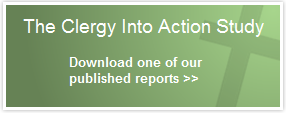“There is no need to wear yourself out, but make a fully competent and sufficient effort, and leave the rest to Him who can do all He pleases.”Ignatius of Loyola in a letter of advice to Jerome Vines1
There is a saying attributed to a variety of Christian leaders including Augustine of Hippo, Ignatius of Loyola and John Wesley: “Pray like it all depends on God, but work like it all depends on you.”
Author Gerald May has lamented the dualistic feeling of this approach: it can invite hypocrisy, confusion of wills and intentions, and a temptation to see oneself (or one’s community) as “God’s special agent.” But at a basic level, somewhere in the midst of what seems to be a dualistic tension, this saying attempts to offer some core sense of the relationship between God’s action and human action.
How do ordained leaders of Christian churches and ministries think about God’s movement and action in relation to the efforts and actions of the faith communities they serve? What do pastors and priests believe about God’s presence and direction in what their congregations become?
We asked recently ordained clergy to rank four statements about God at work in their parishes or congregations, as most (1), more (2), less (3), or least (4) similar to what they believe. The questions lie along a range of theological orientations:
- Predestinational: “God has a plan for our parish and is actively directing us into that future.”
- Semi-Deistic: “God has left the future of the parish open to what we choose to make of it.”
- Semi-Augustinian: “The future of this parish depends on God’s grace and presence moving in our hearts and minds to act.”
- Semi-Pelagian: “As we come up with a vision and sincerely try our best, God will give us the grace to succeed.”
We had asked these questions of more senior, seasoned Episcopal priests ten years earlier. The patterns of responses between those seasoned Episcopal priests and more recently ordained clergy from across Christian denominations were almost identical (see the two graphs below for comparison).
Over 80% of recently ordained ministers ranked the semi-Augustinian view as more or most like what they believe about God at work in their parishes—and 50% gave this theological view their highest ranking. Similarly, 78% ranked the semi-Deistic view as less or least like what they believe about God in relation to the life and work of their parishes.
Breaking this down further, one-third of these recently ordained clergy (33%) opted for the Predestinational view as their strongest belief – that God had a plan specifically for the parish community and was actively directing it toward that future. And 15% chose the semi-Pelagian view – that God would bless the best intentions and efforts of the parish community – as their strongest belief.
This helps account for the 30% of pastors and priests who selected the semi-Augustinian view as their second strongest idea of how God was acting in their communities: within the range of an Augustinian view, they leaned more toward either a strong Calvinist or semi-Pelagian preference. Only 7% of newer clergy indicated a semi-Deistic view of God’s presence and action in the local life of the congregations they served.
So, how then do clergy most effectively pray and act as Christian leaders? From the previous study of seasoned Episcopal clergy, both a stronger intentional personal investment in the direction of ministry (for instance, decisiveness and goal-setting) and an Augustinian view of God’s action in a church’s ministry (and an accompanying intentionality of prayer for the local church) contributed to growth in churches. Episcopal clergy whose parishes grew and increased were more likely to pray for and believe in God’s action in the hearts and minds of people, and were more likely to act clearly, decisively and collaboratively in their congregations and communities.2
1 See more at www.ignatianspirituality.com/13274/work-as-if-everything-depends-on-god/#sthash.esOVeZdy.dpuf
2 John Dreibelbis and David Gortner, Talented but Tenuous: A Profile of Clergy Temperaments and Leadership Skills, research report submitted to the Lilly Endowment (Evanston, IL: Seabury-Western Theological Seminary, 2002).




